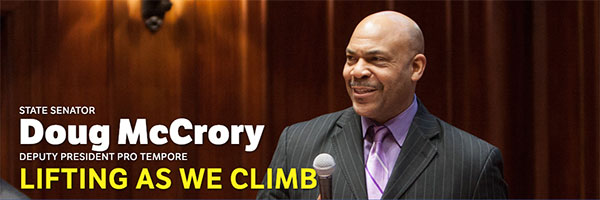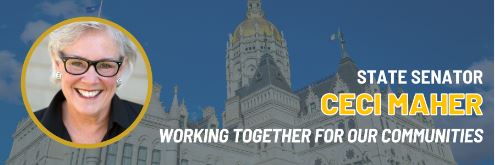|
|
|

|
|
|


Senator MD Rahman, D-Manchester, welcomed the State Bond Commission’s expected Thursday approval of $25 million in funding to bolster the Crumbling Foundations Assistance Fund.
The fund supports the efforts of the Connecticut Foundation Solutions Indemnity Company, a captive insurance company, which assists homeowners with the replacement of foundations that are deteriorating as a result of a naturally occurring mineral called pyrrhotite.
“Crumbling foundations have had catastrophic impacts on the investments of homeowners across Northeastern Connecticut including residents of Andover, Bolton, Glastonbury and Manchester,” Senator Rahman said. “Although assistance programs have helped hundreds of families replace their foundations, it is critical that we continue to help these homeowners. By including this funding on Thursday’s agenda, Governor Lamont and the State Bond Commission have signaled that Connecticut will support these families until their homes are made whole again.”
The issue impacts potentially thousands of Connecticut homes built between 1983 and 2015 with foundations using concrete originating from the JJ Mottes Concrete Company in Stafford Springs.
As co-chair of the legislature’s Planning and Development Committee, Senator Rahman has worked to support families impacted by crumbling foundations. This year, Senator Rahman led passage of Senate Bill 224, which required local assessors to give homeowners at least 90 days’ notice before a revaluation on properties with defective concrete foundations.
This policy affects a state law which allows homeowners whose foundations are crumbling to seek a reassessment in order to reflect the property’s diminished value. Senate Bill 224 provides those homeowners notice before their properties are reassessed.

|
|
|
|
|
|



Connecticut stands as a leader when it comes to the rights of the queer community, standing well ahead of many other states when it comes to the rights of LGBTQIA+ residents. With same-sex marriage legalized here seven years before its federal approval and enshrined rights for same-sex and queer parents, legal defenses and the transgender community, Connecticut can stand proud.
However, more can always be done. A recent report by DataHaven and the Hartford Foundation for Public Giving found that the state’s queer community has priorities for further success in the future – these include expansion of youth-focused spaces safe for LGBTQIA+ individuals, making sure more voices are heard and, most prominently, improving access to housing and shelter throughout the state for those in need. Creating a more welcoming and accepting environment – even in a state where queer rights are enshrined – is vital for adults and children alike, especially to preserve the safety of queer youth, who are at increased odds of discrimination and can struggle under conditions where they are otherized.
While Connecticut is largely perceived as a safe haven for LGBTQIA+ people, especially transgender people – the report said Connecticut has a reputation where queer people move to Connecticut from states where fewer protections are in place – there is always more that can be done. Discrimination against LGBTQIA+ people, especially young ones who may be struggling, was a common feature in the report.
Finding work and housing can be challenging for a number of these individuals, and some groups within it struggle more than others; transgender people, as one example, face more discrimination and struggles than others. A third of all LGBTQIA+ people in Connecticut face difficulty paying expenses, which leapt to 47% for transgender individuals; food insecurity, lower incomes and households experiencing loss of work also were more common for transgender respondents than the general queer community.
Queer individuals in Connecticut are also significantly more likely to face mental health problems, primarily anxiety and depression, than cisgender straight individuals, with these conditions reported by 39% of queer people compared to 25% of the general population. This trend continues for other forms of medical care, with queer respondents missing medical care 2.1 times more than the general population and transgender ones 3.9 times more likely to miss such care. Discrimination was also more common for queer people in health care, police and employment interactions compared to the general public. Disability rates were also higher for queer and transgender groups than cisgender ones.
The report found that while Connecticut is a leader in queer rights in many respects, more work can and should be done. It found that the best responses to these issues is to find areas of improvement, including community outreach to those in need, supporting funding efforts aiding these groups and individuals and increased communication and effort to meet the needs of organizations serving the LGBTQIA+ community.
Posted by Joe O’Leary

|
|
|



If your energy bill went up in July and you’re asking why, you have good reason. Folks statewide are getting unwelcome news when they open their bills – here’s why the increase is happening, and what you can do to shave a few bucks off your payments in the meantime.
Earlier this year, the Public Utilities Regulatory Authority, which makes decisions on electricity regulations in Connecticut, allowed Eversource and United Illuminating to recover funds it previously expended. The ten-month order will be in place through May 2025. The amount will add up to about $30 per month for many households.
These previously allocated funds, about 77% of them, come from the 2017-2019 Millstone agreement, a Republican-led bipartisan agreement that was intended to preserve the Millstone Nuclear Power Station located in Waterford. The effort came from an effort to protect thousands of Connecticut jobs and shore up and improve Connecticut’s access to carbon-free energy resources.
The Millstone agreement was put in place and received bipartisan support amid concerns that without the agreement in place, Millstone’s financial viability would be at risk. Millstone is the only nuclear power plant in Connecticut and the only multi-unit plant in New England; there were concerns that without the agreement moving forward, the source of enough energy to light two million homes and 15% of New England’s total power generation would struggle.
Under the Millstone agreement, Eversource and UI must purchase half of the power plant’s energy output through 2029, which has had a varying cost based on the cost of energy in Connecticut. Our state uses natural gas for 55% of its total energy generation, and in some years, natural gas being much cheaper caused the deal to operate at a financial loss. In some years, like the natural gas limitations and shutoffs occurring at the start of the Ukraine-Russia conflict in 2022, it became financially advantageous.
The agreement to keep Millstone open preserved zero-carbon energy generation in our state as well as jobs. Millstone generates roughly 37% of Connecticut’s energy, heavily supporting state goals of environmentally friendly fuel generation whenever possible. When it was being debated, fluctuation in the marketplace was expected, and costs have shifted over the years.
Where does that leave you as a consumer? Third-party electricity suppliers at www.EnergizeCT.com often offer alternative rates for shoppers to consider, many of which are likely lower than current electric rates. The Office of Consumer Counsel also has a guide to understanding your energy bill better.
Those struggling financially are asked to call power suppliers before missing payments if possible. Aid programs are available including financial hardship designations, which provide access to a Low-Income Discount Rate and payment arrangements for customers in need; energy assistance through the Department of Social Services; negotiated flexible payment arrangements for non-financial hardship customers; and energy efficiency programs offered by utilities to evaluate customers’ homes and provide rebates and discounts on needed improvements.
Posted by Joe O’Leary



A new report is shedding light on the mental health crisis across the U.S. Mental Health America released their 2024 report highlighting how many people in America need and have access to mental health services. Connecticut ranked number 2 in the overall mental health and well-being just behind Massachusetts.
The access to care rankings includes access to insurance, access to treatment, quality and cost of insurance, access to special education, and mental health workforce availability.
About 23% of adults nationwide experienced a mental illness in the past year, which is equivalent to nearly 60 million Americans. In Connecticut, 21% of adults experienced a mental illness. 20% of youth, ages 12 to 17, nationwide experiencing a mental health issue with 19.8% of youth in Connecticut.
Sadly, even when people have some insurance coverage for their mental health, it does not guarantee they will be able to receive mental health care that is covered by insurance. Individuals are often forced to pay to see out-of-network providers because of a lack of mental health providers working in network. A 2024 study found that patients went out-of-network 3.5 times more often to see a behavioral health clinician, 10.6 times more often to see a psychologist, 8.9 times more often to see a psychiatrist, and 19.9 times more often for sub-acute behavioral health inpatient care than to see a medical/surgical clinician.
Access to mental health services is crucial for promoting overall well-being and addressing the diverse needs of individuals. Quality mental health care provides essential support for those experiencing issues such as anxiety, depression, and other disorders. It plays a key role in early intervention and prevention, helping to identify and treat conditions before they escalate.
To reduce the negative impact of the mental health crisis, states must take a public health approach focused on prevention of mental distress and promotion of well-being. Social and community support are integral to overall health, where low levels of social support are associated with poor health outcomes and high levels have been found to improve both physical and mental health. According to data from the 2022 Behavioral Risk Factor Surveillance Survey, the most commonly reported adverse social determinants of health were social isolation or loneliness and a lack of social and emotional support, both identified as proxies for a lack of social connection.
In 2021-2022, only 56% of families in the U.S. reported that their children lived in supportive neighborhoods, (where people in the neighborhood help each other and watch out for each other’s children. Lacking community support is a risk factor for poor mental health outcomes.
To build social connection and promote mental well-being, states and localities must create communities in which people are able to thrive. Some prevention strategies, such as early childhood programs and family economic supports, have been found to have wide-reaching impact on both increased social support in communities and reduction of poor mental health outcomes and adverse childhood experiences.
To review the full report, you can click here.
If you or someone you know needs mental health services, click here.
Posted by Michelle Rappaport

|
|
|
|

|
|
|



Connecticut students can apply to attend community college tuition-free this fall through the Mary Ann Handley Award, a newly expanded program designed to bridge the gap between federal and state aid.
The program is named after the late Mary Ann Handley, a former Democratic state senator from Manchester and a history professor at the community college now called CT State Manchester. Handley was a strong advocate for the community college system and the opportunities it offers Connecticut residents for higher education.
This year, state policymakers expanded the initiative named for Handley by removing several restrictions like requirements that students maintain continuous enrollment or complete their program in 48 months in order to maintain eligibility. The updated program no longer requires that students graduate from a high school in Connecticut to enroll.
To be eligible for the 2024-2025 academic year, participants must be enrolled in a degree or credit-bearing certificate program for at least six credits at any of CT State’s 12 campuses. Students must be Connecticut residents who either graduated from high school, completed homeschool, or received a GED.
They must complete the Free Application for Federal Student Aid (FAFSA) and accept all awarded financial aid. The Mary Ann Handley Award is designed to cover tuition costs leftover after financial aid is applied.
CT State President John Maduko emphasized the program’s importance in a press release earlier this year.
“Connecticut’s dedication to offering one of the nation’s most comprehensive free tuition programs not only underscores a commitment to breaking down financial barriers but also recognizes the pivotal role education plays in driving our economy and increasing personal prosperity,” Maduko said.
Applicants wishing to enroll in the program can visit ctstate.edu/apply to begin the application process and complete the FAFSA at FAFSA.gov using CT State’s federal school code, 007635. There is no separate application for the free tuition benefit; eligible students will be automatically considered.
Posted by Hugh McQuaid